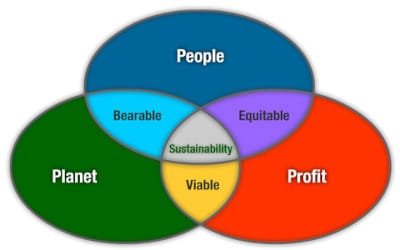Ethical and Governance Challenges for Businesses and Professionals
Published in 2016

Introduction
This report firstly reviews the ethical and governance challenges that confront contemporary businesses and professionals, thereafter analysing the impact of these challenges on organisational strategies and operations, as well as on the skills required by managers for dealing with such issues. Recent years have seen a strange juxtaposition of (a) the incessant occurrence of various types of corporate scandals and misdeeds with (b) an ever growing emphasis on corporate governance and corporate social responsibility (CSR) (Blowfield & Murray, 2010).
Whilst the business world and common society have been and are being affected in various ways by the financial and operational misdeeds of Enron and WorldCom, the banking meltdown of 2008, and the eminently avoidable accident at BP’s oil rig in the Gulf of Mexico, media reports continue to carry extensive reports on the growing adoption of the Global Compact, a UN sponsored worldwide CSR initiative, the growth of the Fairtrade movement and individual organisational efforts for improvement of corporate governance, e.g. Tesco’s five spoke steering wheel (Blowfield & Murray, 2010).
Such conflicting reports often leave management academics wondering about the immense ethical dichotomies and contradictions that exist in the modern environment.
Analysis
History provides us with a long and disturbing relationship between the growth of business and the conduct of various unethical practices (Dricscoll & Hoffman, 2002). The greed of the East India Company, one of the earliest of the joint stock corporations, led to the colonisation of numerous regions and countries, the oppression of millions of people and the destruction and ruin of thousands of businesses that could challenge and compete with English trade (Dricscoll & Hoffman, 2002). The slave trade between Holland, England, and America, the use of slave labour in American cotton plantations and the political manipulation exercised by global oil corporations for protecting and enlarging their energy resources provide evidence of the inherent tendencies of business corporations to engage in appallingly unethical acts for maximisation of profits and enhancement of organisational wealth (Dricscoll & Hoffman, 2002).
The closure of the Second World War, followed by the wave of independence in the colonised countries of Africa, Asia and South America put an end to the oppression carried out by western business firms with the help of their national governments. The subsequent growth of liberal thought in the 1960s and 1970s helped in the realisation of the need for businesses to watch their actions and operate within predefined limits (McDaniel, 2004). Whilst this period marked the commencement of greater expectations from business firms, most business organisations continued to adhere to Milton Friedman’s dictum about the primary responsibility of businesses being the maximisation of organisational profits and wealth, albeit by working within the parameters of the law (Friedman, 1970). Such single minded devotion to profit maximisation and furtherance of shareholder interest has resulted in wide scale environmental destruction and degradation, the development of numerous business monopolies, the enormous growth of multinational corporations and the marginalisation of labour in a technology intensive environment (Halbert & Ingulli, 2006).
Whilst business people continue to be driven by their urge to earn (super) profits, the last two decades have witnessed a sea change in social, community and academic attitudes towards business (Friedman, & Miles, 2002). The evolution of the stakeholder theory has resulted in changes in managerial and business objectives, which have accordingly expanded from their erstwhile focus on shareholder interest to include the interests and wellbeing of diverse other organisational stakeholders like employees, customers, suppliers, larger society, the government and finally the environment (Friedman, & Miles, 2002). It is now being realised that business organisations work within societies and communities and owe much of their organisational success to their interaction with them (Blowfield & Murray, 2010). It thus becomes the clear duty of business organisations to refrain from engaging in actions that are harmful to their various stakeholders, including the society and the environment and furthermore work purposefully towards benefiting them (Blowfield & Murray, 2010).
The growth of such attitudes, both inside and outside business firms, has resulted in the development and spread of a global corporate governance and CSR movement, even as it has resulted in the development of numerous ethical challenges for management professionals (Burchell, 2008). Economic globalisation continues to provide abundant business opportunities to modern day firms, which include access to huge mineral and metal reserves in the developing nations, availability of cheap labour, (including children), for production activities in distant locations, unprotected and vulnerable developing economy markets and easily influenced governmental and regulatory authorities in the emerging nations (Burchell, 2008).
The exploitation of these opportunities can lead to significant organisational profits, but they may also involve harmful and adverse outcomes for vulnerable stakeholders and social segments (Dricscoll & Hoffman, 2002). Western managers, squeezed by the limitations of stagnant local markets and strict regulatory regimes, can not only be attracted by such opportunities and exploit them for personal and business gains but also find it difficult to bring about stakeholder equity in their organisations (Dricscoll & Hoffman, 2002).
Conclusions/h2>
It is important to understand the various ethical dilemmas that confront modern day managers and the emergent need for adoption of high levels of ethics in business life. Whilst managers in the past were unburdened by diverse ethical considerations and were required to work only within the ambit of the law, greater awareness of the role and impact of business in social life and the growth of the CSR movement has created the need for organisations and managers to work ethically and in the interests of diverse stakeholders (Payne & Calton, 2002).
Such working is however easier said than done because of the often contradictory interests of diverse stakeholders and the lesser influence and visibility of some of them. Whilst dealing fairly with different shareholders may require thought and interpretation, there remain a number of acts, like dishonesty, fraud, misrepresentation, and wilful environmental damage that do not require interpretation and analysis. Adherence to strict ethical codes in issues like these will not only resolve most ethical challenges but also help me in taking appropriate decisions in multidimensional and interpretative ethical challenges.
Bibliography
Barry, M., (2011), Managing cross-cultural communication: principles and practice, Basingstoke: Palgrave Macmillan.
Blowfield, M., & Murray, A., (2010), Corporate Social responsibility a Critical Introduction, Oxford University Press: New York.
Brett, J., Behfar, K., & Kern, M. C., (2006), “Managing Multicultural Teams”, Harvard Business Review, 84(11): 84-91.
Brewster, C., Sparrow, P., & Vernon, G., (2011), International Human Resource Management, 3rd edition, London: CIPD.
Browaeys, M. J., & Price, R., (2011), Understanding Cross-Cultural management, 2nd edition, UK: Pearson.
Burchell, J., (2008), The Corporate A Social Responsibility Reader, Routledge: London.
Debroy, B., & Bhandari, L., (2011), “Corruption in India”, The World Finance Review, Available at: www.worldfinancialreview.com/?p=1575 (Accessed November 27, 2012).
Dricscoll, D-M., & Hoffman, W. M., (2002), Ethics Matters: How to Implement Values-Driven Management, Center for Business Ethics, Bentley College: Waltham.
Friedman, M., 1970, “The Social Responsibility of Business is to Increase its Profits”. The New York Times Magazine, Available at: www.umich.edu/~thecore/doc/Friedman.pdf (Accessed November 27, 2012).
Friedman, A. L., & Miles, S., (2002), “Developing Stakeholder Theory”, Journal of Management Studies, 39 (1): 1-21.
Halbert, T., & Ingulli, E., (2006), Law & Ethics in the Business Environment, 5th edition, Mason, OH: Thomson Learning.
Halonen, J. S., (1995), “Demystifying critical thinking”, Teaching of Psychology, 22(1): 75–81.
Hofstede, G., (1983), “Culture’s Consequences: International Differences in Work-Related Values”, Administrative Science Quarterly, 28 (4): 625–629.
Keley, P., (2009), International Business and Management, Singapore: Seng Lee Press.
McDaniel, C., (2004), Organizational Ethics: Research And Ethical Environments, Aldershot: Ashgate.
Schneider, S. C., & Barsou, J., (2003), Managing Across Cultures, 2nd edition, NJ: Prentice Hall.
More From This Category
Inclusion of Networking for Women and Minority Group Members in the Workplace
Modern businesses continue to be dominated by men of the majority community, despite increasing entry of women and members of minority groups. Research has revealed that members of this group tend to, both intentionally and unintentionally interact with people of their own groups on account of homophilous reasons, thereby excluding access to women and members of ethnic minorities.
This results in considerable disadvantages for the excluded groups because network occurrences and dynamics often result in formal decisions for promotions, inclusion in new projects and giving of new responsibilities.
Insights on Management and Leadership
Management theory has come a long way, thanks to the hard work of many researchers and experts (DuBrin, 2009). A legendary management guru, Peter Drucker, summed up management as giving direction, providing leadership, and making smart decisions about resources (Drucker, 1994). Basically, it’s about getting things done and developing people along the way (DuBrin, 2009). In today’s business world, it’s all about putting the customer first and staying ahead of the competition. But that can sometimes lead to tough decisions about ethics and responsibility. This portfolio aims to help leaders and managers navigate these challenges while staying true to their values and commitments.
Impact of Corporate Social Responsibility
Corporate Social Responsibility (CSR) is truly one of the most puzzling aspects of today’s business world (Visser, 2008). It’s evolving rapidly, appearing to be both complex and yet somewhat unclear (Visser, 2008). Despite efforts from academic experts and management practitioners to define CSR, there’s still no universally accepted definition (Visser, 2008). The World Business Council for Sustainable Development takes a stab at it, defining CSR as: “the ethical behaviour of a company toward society; management acting responsibly in its relationship with other stakeholders who have a legitimate interest in the business. It’s the commitment by business to act ethically, contribute to economic development, and improve the quality of life of the workforce, their families, and the local community and society at large.” (Petcu et al., 2009, p. 4)




0 Comments